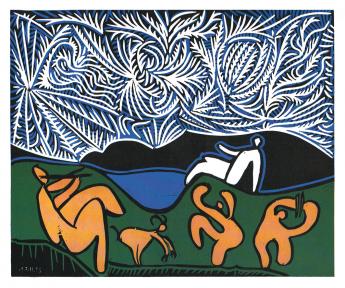Ulrich Engel
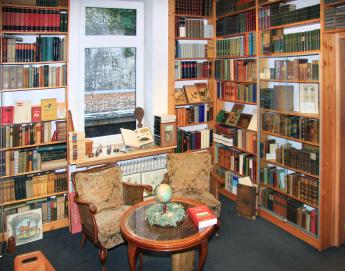
By Frank Werner
Mention the city of Stuttgart anywhere, and the first thought is „Mercedes Benz“, „Porsche“ or perhaps „Robert Bosch“. What is less well known is that Stuttgart is one of the big “book cities” in Germany. When Leipzig lost importance after the war, many publishers and book distributors moved here. It has always been a reading town, not for nothing does Friedrich Schiller hail from here. Friedrich Hölderlin and Hermann Hesse lived and suffered nearby. The philosopher Georg Wilhelm Friedrich Hegel and the publisher Johann Heinrich Cotta were born in Stuttgart, where a century later Mies van der Rohe built the famous “Weissenhofsiedlung” on the hills that surround the city centre.
Stuttgart is also a centre of anthroposophy in Germany. The first Waldorf School was founded here, by Rudolf Steiner himself. So it does not come as a surprise that the oldest and largest bookshop specialised on anthroposophy is located here: Engel & Co. It has had several names during its history, but the basic premise has never changed: to purvey anthroposophic literature in particular and a select stock of good literature in general.
In 1928 the first anthroposophic bookshop in German was founded in Stuttgart and called “Bücherstube Else Bühler”, followed in 1935 by the “Buchhandlung Wezorke”. The Nazis were not overly fond of anthroposophy, but both shops survived the reign of terror and the war. In 1953, Herbert Engel – father of the present owner Ulrich Engel – began his apprenticeship at the “Buchhandlung Wezorke”. In 1964 he took over the shop which was then called “Buchhandlung Engel”. Today it is still situated in the same house at Alexanderstraße 11.
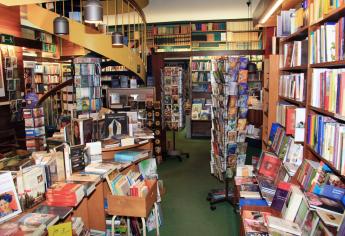
As was often the case, a small second hand department grew next to the new books. At first it mostly stocked art books, but when Walter Streffer joined the company in 1969, this changed. The emphasis was now placed on natural history books. In 1970 the first antiquarian book catalogue was published. Nine years later Ulrich Engel, Herbert’s son, began his apprenticeship in the antiquarian department. In Germany, antiquarian booksellers used to have an apprenticeship rather different than modern booksellers. Apprentices attend the same trade school, but have additional classes, and they also have to pass a different and rather more difficult exam after three years.
When Walter Streffer left the firm, Ulrich Engel, who had just passed his exams, started managing the antiquarian book department, while his father Herbert Engel managed the modern bookshop until he had to retire due to ill-health a few years ago. Since then Ulrich Engel manages the whole company, ably assisted by his charming wife, Elke, and an equally charming and knowledgeable staff.
The Alexanderstraße in Stuttgart is a steep road, lined with late 19th century sandstone buildings. If you climb the street to house no. 11 and open the unassuming door, you step into another, better, world. You are in a real bookshop. There are no toys or teddy bears, no wine nor noodles nor other bric-a-brac. In vain will you look for a coffee point. But there are BOOKS. Good, beautiful, selected BOOKS. Hardly any paperbacks. There is an emphasis on anthroposophic literature, but it does not dominate the stock. Talking to the pleasant, well-informed assistants, you get the feeling that they have read every single book that they tout, and they probably have. Customers are greeted as friends, most are known by name and reading preferences. This is how it must have been in the “old days”, before the huge book store chains dominated the scene.
If you wish to visit the antiquarian department, you have to climb a spiral staircase, its steps, of course, adorned with books. There are four rooms upstairs filled, but not crowded, with second-hand and antiquarian books. There is a recognisable order here. The scientific antiquarian bookshop is evident, there are many natural history books.
You are not eyed suspiciously but left in peace to browse the shelves. Ulrich Engel, if he is not just then in the bookshop, the stockroom, the packing room, away buying even more books, or having a stealthy smoke, works in a large room off to one side. Every even surface in this room is stacked with books, and the floor has sprouted printed stalagmites, tottering dangerously. Ulrich moves through this jungle with assurance, and finds every book he is looking for. A phenomenon! There are several desks, or desk-like book stacks, and one carries a large computer screen and a small keyboard. At this desk and this computer, Ulrich manages, among his many other duties, to publish a slim antiquarian book catalogue nearly every month. The descriptions are short, but correct, the prices are moderate. Good books at sensible prices. He has now reached Catalogue 200, and such a number merits a somewhat special catalogue. Thus this catalogue is entitled:
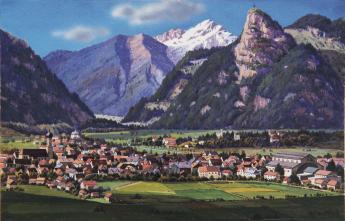
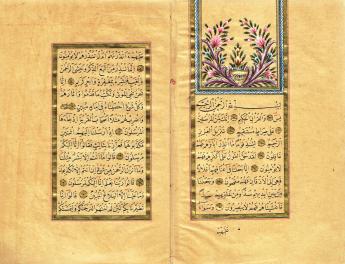
200 Beautiful, Old, Rare and Precious Books
Literature, Art, Philosophy, Natural History, Geography, Travel
The catalogue is profusely illustrated, nearly every object is accompanied by a coloured picture. A small collection of autographs comprises letters by Carl Gustav Carus and Ernst Haeckel. The Literature chapter contains two highlights: Ess-Seyyid Muhammad Zakir “The 99 names of Allah” (9.800 €), an exceptionally beautiful manuscript, illuminated in colours and gold. It was written in 1850 by the Sultan’s calligrapher in Istanbul. Very few copies of his work are known. The other is a huge collection of watercolours and etchings by the brothers Josef and Vinzenz Marschall. The pictures show landscapes, towns and villages from Southern Germany (7.800 €). Also for sale in this catalogue: Ernst Bloch’s doctorial thesis, published in only a few copies (1.500 €), Dionysus Aeropagita’s “Caelestis hierarchia”, printed in Venice in 1502 (2.400 €), and of course, there are several works by Rudolf Steiner, the most important being the rare first edition of “Die Philosophie der Freiheit”, printed in Berlin in 1894.
The natural history and travel sections in Catalogue 200 contain a rare complete copy of Füeßly’s “Archiv der Insectengeschichte”. This book was published in eight instalments between 1781 and 1786 with 51 coloured plates (1.900 €). Engelbert Kaempfer’s “Amoenitatum exoticarum” decribes not only Japan, but also Persia and the Crimea. This is the first edition, in a handsome leather binding (4.500 €). Carsten Niebuhr travelled in Arabia to verify the natural history of the bible. A very good copy, well illustrated and in a good contemporary leather binding is offered for 2.800 €.
These are a few of the highlights from a catalogue, in which every object is a highlight in its way. Catalogue 200 mirrors the joy in, and love of books, which Engel & Co. radiates.
So, if you should ever come to Stuttgart – and you should to visit the 54th Stuttgart Antiquarian Book Fair from 23 to 25 Januar 2015 – climb up the Alexanderstraße to house no. 11 and enter this marvellous bookshop. It is well worth it!
***
Published here by permission of the author. Pictures: Engel & Co.
Engel & Co.
Buchhandlung und Antiquariat
Alexanderstraße 11
70184 Stuttgart
GERMANY
Opening hours:
Monday - Friday 9 am - 6.30 pm
Saturday 9 am - 1 pm
Internet:
54th Stuttgart Antiquarian Book Fair
23 to 25 January 2015 - Württembergischer Kunstverein
Schlossplatz 2, Stuttgart, GERMANY
Opening hours: Friday 11 am to 7.30 pm, Saturday and Sunday 11 am to 6 pm
>>> Click here for more information
